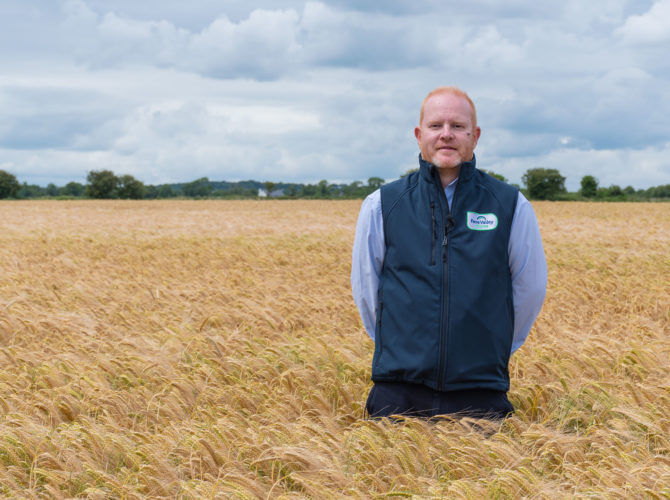2024 Winter Cereals Varieties – Fane Valley’s Top Picks
9th September 2024

Managing what you can control is essential when growing crops and with many variables including the weather influencing grain yield and quality, variety selection is of paramount importance as the number one risk reducer. Stephen Bell, Technical Support Manager, emphasised that Certified seed of a low-risk variety paired with a seed treatment tailored to the needs of your rotation and drilling date will ensure your crop gets off to the very best start, reducing risk, improving plant health and increasing resilience and yield potential from the day one.
With wet weather disrupting drilling last season we are all keen to get straw cleared, stubbles cleaned, and crops established in good conditions. The Fane Valley portfolio of winter cereal varieties has been specially selected to help reduce risk on farm, with the key agronomic traits of yield, specific weight, disease and lodging resistance top priorities, providing flexibility for reducing risk across the autumn drilling period.
Studying the AHDB Recommended List provisional harvest data for 2024, LG Caravelle stands out as a top pick, leading the pack of 2-row winter barleys with impressive treated and untreated yields this low-risk variety ticks all the agronomic boxes while boasting excellent grain quality on par with Cassia for filling the head with large well filled grains. Alongside the reliable favourites KWS Tardis and Bolton, LG Caravelle will be in the top three barleys on farm this autumn. Annemiek a new 2-row barley from Nordic seedshas also looked impressive in trials this season, with very high yield potential, outstanding resistance to disease and good grain quality.
Molly and Orcade provide confidence at early drilling where BYDV is always a risk. Both 2-row barleys displaying strong agronomics with the added advantage of built in genetics providing tolerance to BYDV, reducing yellowing and stunting, helping to maintain yield and quality in high BYDV pressure seasons.
SY Canyon and SY Armadillo, two new 6-row hybrid varieties have performed very well on farm in 2024 and produce high yields of quality grain over a range of drilling dates. Together with the well-established 6-row Belfry, they are best suited to drier earlier ground as their vigorous growth habit requires attention earlier in the spring than 2-row varieties.
Septoria resistance, high treated and untreated yield drives wheat variety selection. Champion and Bamford lead the pack in terms of yield closely followed by firm favourites KWS Extase, Graham and Spearhead. Mayflower has exceptional agronomic merit, with table topping septoria resistance, Mayflower is already proving to be very much in demand this autumn.
Mascani and Husky favoured by White’s Oats for their consistency in terms of quality and milling yield are available, there is limited availability of Mascani seed this season and should be ordered early to avoid disappointment.
The popularity of hybrid rye continues locally and when grown as whole crop provides an excellent second forage to supplement grass silage diets. This season the varieties, KWS Igor, KWS Tayo, SU Perspectiv and SU Baresi are available and are well suited for wholecrop silage for livestock or as a feed stock for anaerobic digesters. Hybrid rye is best sown from mid-September through to mid-October and is a relatively low input crop in comparison to other cereals. Seed of KWS Fido winter triticale is also available and like rye offers an alternative cereal option for wholecrop.
Seed treatments push performance, helping crops get off to the very best possible start, by boosting plant health, reducing disease, promoting early root growth, increasing access to nutrients, improved tiller retention and overall establishment success. Take-all was prevalent in 2024, early drilling coupled with the wet, mild winter favoured build-up of inoculum in the soil resulting in Take-all symptoms in many wheat crops. Latitude seed treatment is the only way of helping to reduce Take-all and should be considered in all second and third wheat crops.
Manganese, applied as a seed treatment is particularly beneficial to the establishment of the crop where cereals follow grassland are a second or third cereal, in high pH soils, soils, which have recently been limed, high P low K soils, where there is poor drainage or in puffy unconsolidated seed beds.
Kick-off, a phosphite based nutritional dressing can be applied to seed improving crop vigour and resilience offering added protection through the winter, especially in cold wet seed beds.
New for 2024 we are excited to introduce Tiros Max a new biological seed treatment to our range. Tiros Max has been shown to increase yield by up to 0.5t/ha by using specialised strains of endophyte bacteria capable of unlocking soil phosphate (P) and making it available the plant promoting rooting and tiller retention, especially important in high P soils where no fresh seed bed P can be applied and at later drilling dates where soil P availability is limited by soil temperature. The bacteria are also capable of converting atmospheric nitrogen into plant available nitrogen, providing a backup supply of up to 30kg N/ha to the crop throughout the season ensuring that growth does not suffer when wet weather prevents nitrogen applications or uptake via the roots. This new innovative seed treatment technology can enhance resilience and sustainability of crop production by improving plant health and supporting yields whilst reducing reliance on artificial fertiliser.
For further information and advice on rotation planning, variety selection and seed treatments please contact your local Fane Valley Agronomist or call the Agronomy and Forage team on 028 9261 0485.

